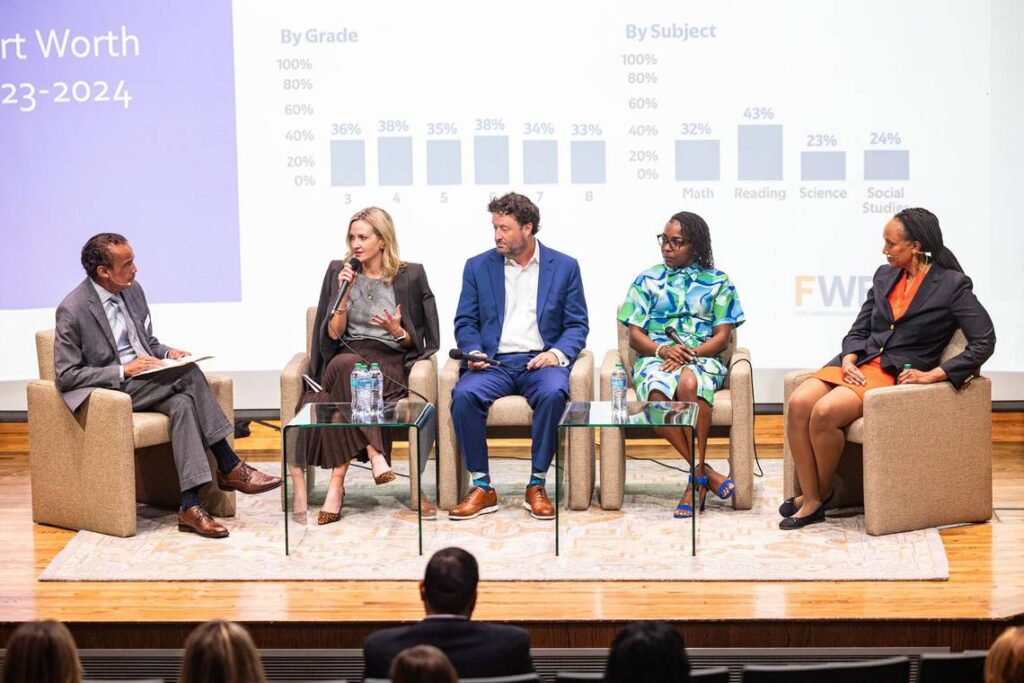On October 8, more than 100 community members convened at the Fort Worth Botanic Garden to engage in a vital conversation focused on the significance of literacy and its consideration as a fundamental civil right, amidst alarming statistics concerning reading proficiency in Fort Worth. Recent findings from the Fort Worth Education Partnership revealed that nearly 60% of students in grades three through eight failed to achieve grade-level reading standards in Fort Worth public schools this year. The State of Texas Assessments of Academic Readiness (STAAR) showcased even graver concerns, indicating that only 33% of third-graders in the Fort Worth Independent School District (FWISD) were reading at grade level. This persistent issue of illiteracy among Fort Worth students has provoked renewed urgency within the education sector, especially in light of FWISD’s test scores falling short of those from comparable urban districts, including Dallas ISD.
This urgent call for educational reform followed a significant letter from Mayor Mattie Parker and 45 other community leaders directed to school board members, wherein they labeled the district’s academic state as “unacceptable.” In their correspondence, they advocated for a transformative and coordinated approach to enhance the educational system and reestablish FWISD as a district of choice for families. The timing of this event coincided with the appointment of an interim superintendent, Karen Molinar, after the resignation of Angélica Ramsey—reflecting ongoing leadership changes in response to the pressing educational challenges facing the district.
The “Is Reading a Civil Right?” event was spearheaded by various community organizations, including the Fort Worth Star-Telegram’s Crossroads Lab and Fort Worth Chamber of Commerce, emphasizing the community-wide commitment to addressing the literacy crisis. In her keynote address, Kimberly Jenkins Robinson, director of the Education Rights Institute at the University of Virginia School of Law, framed literacy as an essential key to unlocking student engagement in critical societal aspects such as democracy and the economy. Contrarily, she portrayed illiteracy as a severe disability that poses significant barriers to individuals’ everyday lives, from understanding healthcare forms to participating in the electoral process. Robinson pointed to civil rights legislation, such as the landmark Brown vs. Board of Education case, to illustrate the necessity for equal educational opportunities and stressed that despite progress, the original promise of educational equality has yet to be completely realized.
Robinson elaborated on the disparities in educational quality linked to state regulations, noting that without a federal right to education, local policies must evolve to support high-quality literacy education. She challenged Fort Worth to prioritize literacy within its educational agenda, asserting that the community must allocate adequate resources toward this cause to enable students to thrive. Emphasizing that “you are not free if you are not literate,” Robinson impelled those in attendance to advocate for systemic shifts aimed at achieving educational parity, irrespective of a child’s background.
The panel discussion, moderated by Bob Ray Sanders, delved into the root causes of the local literacy crisis and the discrepancies between academic report cards and actual student performance. Panelists, including Parker, Robinson, Trenace Dorsey-Hollins from Parent Shield Fort Worth, and Brent Beasley from the Fort Worth Education Partnership, expressed concerns about the lack of national commitment to address literacy issues for all students. They shared sobering statistics about reading proficiency rates, like the mere 6% of students at a specific school in Fort Worth reading at grade level. The discussion revealed a consensus that community leaders recognize the need for open and honest dialogue about the education system’s failures while acknowledging the consequences of prior complacency.
As the conversation progressed, Parker highlighted the necessity for effective and open cooperation among community stakeholders, claiming that it is politically expedient to face the educational challenges directly rather than ignore them. She reflected on her own experiences, noting her decision to withdraw her children from the district due to educational shortcomings—a choice not available to all families. Dorsey-Hollins emphasized the importance of an incoming superintendent equipped to drive academic improvement, particularly for Black students and those struggling with literacy. She urged for transparency and accountability regarding data sharing with families and highlighted the crucial need for targeted intervention strategies to help bridge the significant gaps in learning experienced by many children.
The event encapsulated a collective acknowledgment of the educational deficiencies facing Fort Worth and the importance of unifying efforts to address them. Dorsey-Hollins underlined the necessity for additional support systems, citing the effectiveness of previous intervention programs that rapidly advanced children’s reading skills within a short span. She argued that if educational institutions dedicated adequate time and tailored intervention to students significantly behind in their reading proficiency, they could achieve substantial progress. This meeting of community members not only shed light on the pressing literacy crisis but also formed a foundation for collaborative efforts toward long-term educational reform, equitable access to quality literacy education for all students, and recognition of literacy as a fundamental civil right.

